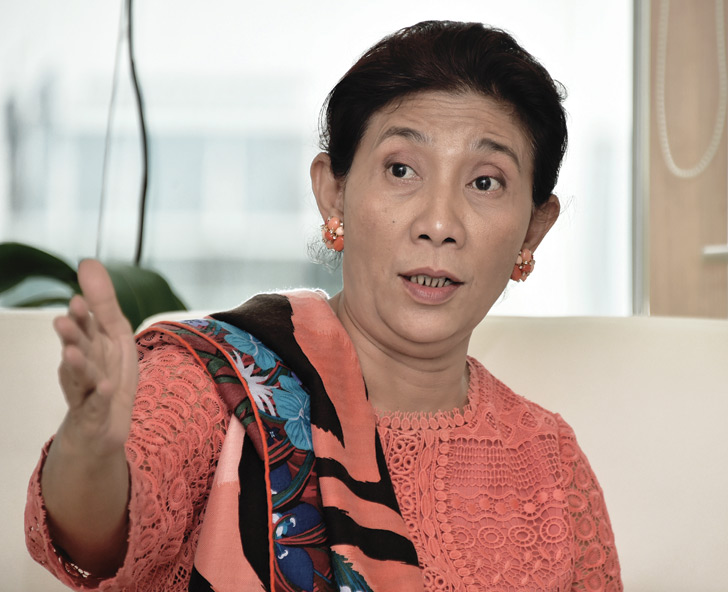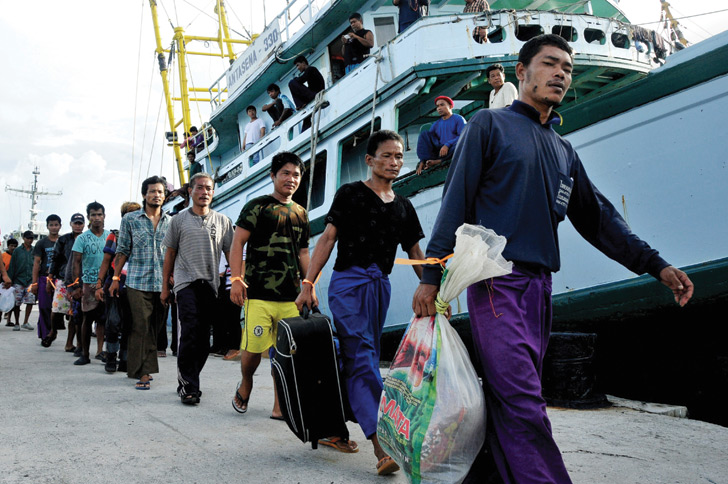Inside the formerly dull Indonesian Ministry of Maritime Affairs and Fisheries, a recent, sleek renovation of the buildings is reflective of ongoing efforts to overhaul the country’s maritime sector.
President Joko ‘Jokowi’ Widodo aims to turn Indonesia into a maritime power by paying more attention to the archipelago’s vast and resource-rich seas, with a clampdown on unlawful vessels plundering the country’s rich fishing grounds key to this plan.
Live broadcasts of illegal fishing boats, most of which are foreign and from neighbouring Southeast Asian countries, being blown to pieces streamed to the ministry’s command control room have become
a new fixture for journalists. The latest display was on 5 April, with 23 vessels – 13 from Vietnam and ten from Malaysia – destroyed concurrently in seven locations across the country.
However, the sinking of boats has irked the vessels’ countries of origin, while some argue the new regulations to overhaul the fisheries sector have not boosted production or improved fishermen’s lives. The measures are as controversial as the woman who is first in command at the ministry, fiery businesswoman-turned-government minister Susi Pudjiastuti.

“It is actually not fun to blow up the boats. I do it for a deterrent effect and to uphold our constitution,” Susi said at a press briefing at the ministry on 1 April. World Bank figures suggest Indonesia loses up to $20 billion per year through illegal fishing, which it says threatens 65% of its coral reefs and damages the country’s marine ecosystem.
More than 170 confiscated boats have been sunk since Pudjiastuti took office in October 2014, including the Nigerian-flagged Viking, which had been on Interpol’s wanted list since 2013 for poaching protected species in remote waters of the Antarctic. Its shattered remains have been left in pristine waters off Pudjiastuti’s hometown of Pangandaran, West Java, as a monument to remind “the next generation that there is such a criminal activity that can disable the country’s economy”.
Pudjiastuti’s public obliteration of foreign ships has undoubtedly given a much-needed positive sheen to Jokowi’s boisterous cabinet lineup, which has been marred by ministerial bickering. Muhammad Qodari, executive director at political pollster Indo Barometer, said the public perceives her as fearless, making her one of Jokowi’s most popular ministers.
“There is a dramatic element because television stations broadcasted the blowing up of the boats. It helped to popularise her [as a] figure. There is also an element of courageous nationalism because she is seen as waging war against foreign vessels stealing Indonesia’s resources,” Qodari said.
Pudjiastuti recently waged a high-profile battle against a Chinese fishing vessel caught by a ministry patrol boat in late March. It was spotted inside the Indonesian exclusive economic zone off Natuna Island that borders the disputed South China Sea – an area that overlaps with China’s nine-dash-line, which Beijing claims asserts its rights to much of the abundant waters in the South China Sea.
A Chinese coastguard vessel rammed the Kwan Fey as the ministry boat was towing it to detention. Indonesian patrol officials on board the confiscated vessel quickly transferred to their own boat to avoid further incident but detained the Chinese crew. The incident raised questions concerning Indonesia’s impartial stance in the South China Sea dispute and whether it would continue in the mediating role it has played between Beijing and four other Asean member states over territory. China insisted the boat was fishing on its traditional fishing ground, an assertion Susi was quick to rebuff.
“We don’t accept their claim [that this is a] historical traditional fishing ground, we feel [they have] interfered by what they did,” Pudjiastuti said, adding that the heart of the issue was the conflicting statements from China, which has said that it recognises Indonesia’s exclusive economic zone while also asserting that the zone is within its own historical fishing area.
“In Susi’s case, her policy is witnessed by a lot of people, given that television remains the most-consumed media in the country, so it gives people the impression that she firmly defends the country’s interests. Whether it really benefits the people in the field is debatable,” Qodari said.
Pudjiastuti claims that prior to the crackdown, annual growth in the fishing industry was only 7%, despite favourable economic conditions. Now, however, even in the face of a global economic slowdown, the situation has been reversed, and she has set a target of more than 20% growth annually and is confident that productivity will continue to rise. “In the maritime world, sustainability means that the more you regulate, the more productive your ocean will be,” Pudjiastuti said.
Data from the Central Statistics Agency, provided by the minister, shows that the country’s fisheries industry grew 8.9% in the fourth quarter of 2015, up from 8.2% in the same period the previous year.
However, Abdul Halim, secretary general of the People’s Coalition for Fisheries Justice, said the figures did not accurately reflect the realities on the ground, saying that any benefits from this nationwide industry growth had not flowed through to coastal communities. He argued there is a “disconnect” between small-scale fishermen and those processing and marketing fish products, whereby the former are being stymied by a depletion of coastal fishing grounds, a lack of access to capital and are being preyed on by loan sharks. Meanwhile, those higher up the chain reap the financial rewards.
Pudjiastuti’s policies aimed at overhauling the fisheries sector also include imposing a moratorium on fishing vessels previously owned by foreign parties and banning the use of trawling nets and dragnet fishing within Indonesian waters. Critics say the measures have greatly reduced fishermen’s yields, lowered productivity and threatened the jobs of thousands of crew, as well as those of workers in the processing industry.
Nimmi Zulbainarni, an expert from the fisheries resources department of Bogor Agricultural University, in the Indonesian city of Bogor, said Pudjiastuti’s policies are being rolled out partially formed and key stakeholders were not consulted beforehand. “She only aimed for sustainability while failing to take into account that the policies put a halt on the fishermen’s economic activity,” Zulbainarni said.

Thousands of fishermen demonstrated in front of the ministry’s office on 5 April to protest the prohibition of trawling nets and dragnets. Mujiono, the head of the fishermen’s association in Lamongan, East Java, said the ban threatens the livelihoods of about 7,500 people in the local area because fishermen haven’t been able to fish to their full capacity for a year, creating a domino effect for those in the processing line. “She should have consulted with us first and listened to our concerns,” he said.
Pudjiastuti acknowledged that there are clusters of fishermen who have not enjoyed the windfall in the industry, especially those on Java’s northern coast where overfishing occurred, and rebuffed accusations that she created the policies hastily. “Reforming is not an easy job; there are a lot of pros and cons. The challenges are huge. There are always rallies and calls to fire me.”
After Jokowi met with a high-level delegation of Chinese officials on 13 April, cabinet secretary Pramono Anung described the maritime clash between the two countries as a “misunderstanding”. “We respect each other’s territory; there are no [competing] claims at all,” he added.
However, Hikmahanto Juwana, a professor of international law at the University of Indonesia, called for continued assertiveness from Jakarta toward Chinese boats fishing illegally.
“Indonesia has a free and active foreign policy, and it doesn’t necessarily translate as having no enemy. Every country is a friend until they infringe on our territory or sovereign rights.”


